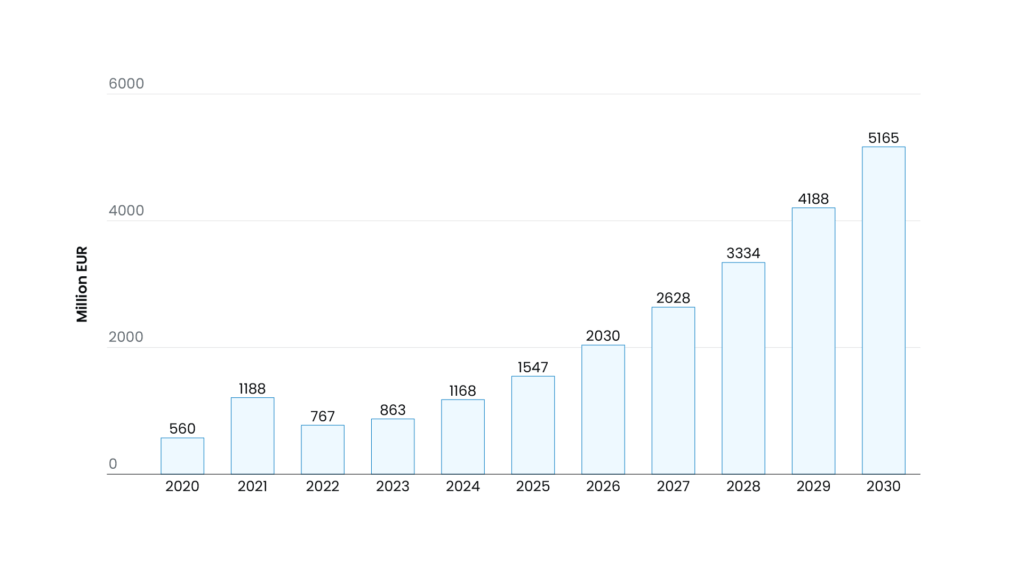 ENG
ENG- Branchen
- Finanzen
Nearshore-Softwareentwicklung für den Finanzsektor – sicher, skalierbar und Compliance-gerechte Lösungen für Banking, Zahlungsverkehr und APIs.
- Einzelhandel
Softwareentwicklung für den Einzelhandel – E-Commerce, Kassensysteme, Logistik und KI-gestützte Personalisierung durch unsere Nearshore-Engineering-Teams.
- Verarbeitende Industrie
Nearshore-Softwareentwicklung für die Industrie – ERP-Systeme, IoT-Plattformen und Automatisierungstools zur Optimierung industrieller Abläufe.
- Finanzen
- Was wir tun
- Services
- Technologien
- Kooperationsmodelle
Kooperationsmodelle passend zu Ihren Bedürfnissen: Komplette Nearshoring Teams, deutschsprachige Experten vor Ort mit Nearshoring-Teams oder gemischte Teams mit unseren Partnern.
- Arbeitsweise
Durch enge Zusammenarbeit mit Ihrem Unternehmen schaffen wir maßgeschneiderte Lösungen, die auf Ihre Anforderungen abgestimmt sind und zu nachhaltigen Ergebnissen führen.
- Über uns
- Wer wir sind
Wir sind ein Full-Service Nearshoring-Anbieter für digitale Softwareprodukte, ein perfekter Partner mit deutschsprachigen Experten vor Ort, Ihre Business-Anforderungen stets im Blick
- Unser Team
Das ProductDock Team ist mit modernen Technologien und Tools vertraut und setzt seit 15 Jahren zusammen mit namhaften Firmen erfolgreiche Projekte um.
- Wozu Nearshoring
Wir kombinieren Nearshore- und Fachwissen vor Ort, um Sie während Ihrer gesamten digitalen Produktreise optimal zu unterstützen. Lassen Sie uns Ihr Business gemeinsam auf das nächste digitale Level anheben.
- Wer wir sind
- Unser Leistungen
- Karriere
- Arbeiten bei ProductDock
Unser Fokus liegt auf der Förderung von Teamarbeit, Kreativität und Empowerment innerhalb unseres Teams von über 120 talentierten Tech-Experten.
- Offene Stellen
Begeistert es dich, an spannenden Projekten mitzuwirken und zu sehen, wie dein Einsatz zu erfolgreichen Ergebnissen führt? Dann bist du bei uns richtig.
- Info Guide für Kandidaten
Wie suchen wir unsere Crew-Mitglieder aus? Wir sehen dich als Teil unserer Crew und erklären gerne unseren Auswahlprozess.
- Arbeiten bei ProductDock
- Newsroom
- News
Folgen Sie unseren neuesten Updates und Veröffentlichungen, damit Sie stets über die aktuellsten Entwicklungen von ProductDock informiert sind.
- Events
Vertiefen Sie Ihr Wissen, indem Sie sich mit Gleichgesinnten vernetzen und an unseren nächsten Veranstaltungen Erfahrungen mit Experten austauschen.
- News
- Blog
- Kontakt

04. Juni 2025 •6 minutes read
The digital shift in Sweden’s manufacturing sector: Trends and forecasts for 2025
ProductDock
For Sweden’s manufacturing sector, driving innovation has never been more important. Industry 4.0 is accelerating the shift towards smart manufacturing, where digital advancements such as IoT, artificial intelligence and big data are streamlining operations and creating more efficient production systems. As automation, data analytics, and interconnected systems continue to rise, industries like automotive, electronics, and machinery are increasingly leveraging modern technology to ensure higher production capacity, reduce downtime, and optimize resource utilization. A study shows that by the end of 2025, Sweden’s manufacturing sector could achieve SEK 160-220 billion annually through the wider adoption of these technologies, signaling growth across the broader manufacturing industry.
From ERP systems to IoT platforms and automotive software, manufacturing companies are accelerating transformation to build resilience and drive growth. In particular, advanced technologies like machine learning and real-time analytics are becoming essential assets.
In this blog, we dive deep into the transformative trends shaping Sweden’s manufacturing landscape and offer insights into how digitalization will drive the industry’s evolution in the years to come.
The rise of robotic process automation and AI-driven solutions
Automation is a cornerstone of digital transformation in manufacturing, and its adoption is rapidly growing, with 70-80% of manufacturing industries already automating their processes. Robotic process automation (RPA) plays a key role in this shift. It enables manufacturers to automate repetitive tasks, reduce human errors and enhance overall operational efficiency. RPA frees up employees from mundane tasks, allowing them to focus on more strategic and creative tasks. For example, RPA bots can automate processes such as data entry, supply chain logistics and inventory management.
Advanced robotic systems and automation technologies are enabling factories to operate around the clock with fewer workers, significantly reducing operational costs while increasing efficiency. In Sweden, this trend is clearly evident in the growing automotive industry robotic market, which is projected to reach US$159.76m by 2025. Revenue in this sector is expected to show an annual growth rate of 15.69%, bringing the market size to US$286.17 million by 2029.
The integration of AI and machine learning further accelerates the evolution of robotic systems. According to the study by the National Association of Manufacturers, 72% of surveyed manufacturers reported increased operational efficiency and reduced costs after deploying AI.
Combined with AI-driven solutions, robotics can take on more complex tasks that were traditionally performed manually. For example, AI technologies can carry out product quality inspections, optimize production schedules, predict maintenance needs, and improve quality control. By analyzing massive datasets, these systems can uncover patterns and make data-driven predictions, driving further optimization of manufacturing processes.
Studies show that 78% of manufacturers have implemented or are planning to invest in supply chain software that enables advanced supply chain planning, better collaboration with suppliers and enhanced visibility. This software has been ranked among the top 5 technologies for driving the most significant ROI.
A real-world example of this transformation comes from Maria Strömsdörfer, a product owner at an automotive company in Germany. She explained that their company collected large amounts of data from various areas, and to better utilize it, they needed a custom software solution. Partnering with a nearshore software development company, they developed a custom solution that included front-end and back-end development using open-source technologies. This software allowed the company to operate more efficiently and make more informed decisions.
The emergence of smart factories and autonomous production systems
In traditional manufacturing, it is often difficult to keep track of everything happening on the shop floor. With numerous processes, employees and production lines running simultaneously, misalignment and inefficiencies are common. With the rise of digital technologies, connected devices, and advanced automation systems, smart factories that optimize material flows, facilitate production management and allow performance monitoring in real-time. By using different technologies, such as IoT devices, ERP systems, and AI technologies, factories achieve automated workflows and become self-regulating systems, reducing the need for human involvement in repetitive tasks. This shift allows better communication, faster decision making and less downtime.
In Sweden, the manufacturing sector has increasingly recognized the benefits of adopting smart factories. Many companies are leveraging these advanced technologies to modernize their processes, making production not only more efficient but also more sustainable. Beyond improving efficiency, smart factories contribute to reducing emissions, which aligns with Sweden’s environmental goals and promotes a greener future.
One example of a company embracing this shift is the KAMAX Group, a leading producer of high-strength fasteners for the automotive industry. KAMAX has digitized its plant to increase efficiency and transparency. They have developed a digital dashboard that provides employees with real-time access to production data and ensures smoother operations and better decision-making. Additionally, they built a KPI board to track performance, identify potential issues and drive continuous improvement throughout the plant.
The integration of IoT in manufacturing operations
The integration of IoT in the manufacturing industry has become a transformative trend, particularly in industries like machinery, automotive and electronics. When IoT is connected with machinery, robots and other factory units, they enable seamless communication between devices, allowing them to autonomously coordinate operations, share data and make informed decisions. IoT platforms give operators real-time visibility and control over manufacturing processes, improving efficiency, safety and reducing risks of unscheduled maintenance.
According to McKinsey’s research, IoT applications in manufacturing could generate an economic impact ranging from $1.2 to $3.7 trillion annually by the end of 2025.
Deloitte’s findings highlight that predictive maintenance enabled by IoT leads to a 70% reduction in equipment breakdowns and a 25% decrease in maintenance costs. This explains why 78% of supply chain leaders are increasingly seeking technological solutions to accelerate production and delivery timelines and automate repetitive tasks.
Sweden’s manufacturing companies follow this trend. They increasingly collaborate with an experienced software development team that specializes in identifying and implementing the most effective digital solutions to optimize their workflows.
As Đorđe Mijailović, a full-stack developer working on business analytics tools for a global leader in the automotive industry, puts it:
“The great thing about working on a manufacturing project is that I had the freedom to make key decisions about how to solve customer challenges. It wasn’t just about technical decisions and coding, but about being deeply involved in identifying problems alongside the business team and then solving them through code”.
Challenges and opportunities in the Swedish market
As companies expand their global reach, managing the intricacies of sourcing, logistics, and inventory is becoming increasingly challenging. This has created opportunities for solutions such as real-time data tools and predictive analytics. According to a 2024 report on industrial product manufacturers, big data, advanced analytics, supply chain digitalization, and data management will play an important role in shaping the industry in the years ahead.
In Sweden, the ongoing digitalization of operations is driving a growing demand for tailored software solutions, particularly for modern ERP systems and supply chain optimization. Sweden’s commitment to innovation further underscores the fact that the government is backing AI advancements through initiatives like AI Sweden. Major companies, such as Volvo, have already begun embedding AI into their operations, using it to automate processes, improve predictive maintenance and improve customer service.

Source: Market study: The Swedish market for IT services, Open Trade Gate Sweden, October 2024
As a country committed to achieving net-zero emissions by 2045 and consistently ranking high on the SDG (Sustainable Development Goals) Index, Sweden is well-positioned to adopt technologies such as IoT-enabled energy management systems, smart grids, and sustainable supply chain solutions. These innovations not only enhance efficiency but also cater to the market’s growing demand for green solutions, attracting eco-conscious customers.
Despite the numerous opportunities, some obstacles remain. Many companies still rely on outdated infrastructure, creating significant challenges in integrating new technologies. The process of transitioning from legacy systems to more modern solutions can be both complex and costly, requiring careful planning and investment. Additionally, as digital technologies continue to advance, the demand for skilled talent in Sweden remains a significant challenge. Manufacturers will need to prioritize finding and retaining top tech talent to stay competitive.
Conclusion
The rise of digital transformation opens numerous opportunities for manufacturing companies in Sweden. By adopting automation software, IoT platforms, ERP systems, machine learning for AI predictive maintenance and other advanced tools, manufacturing companies can unlock new levels of efficiency, precision and scalability. These innovations drive more efficient production processes, increase resource utilization, ultimately generating significant value.
However, it is crucial for manufacturers to remain mindful of the challenges ahead. Strategic investment in digital infrastructure, upskilling the workforce and partnering with reliable software providers will be essential to maximizing the potential of digitalization.
Balancing technology and sustainability efforts will be key for establishing leadership in the Swedish manufacturing industry and ensuring long-term growth in this rapidly dynamic market.



